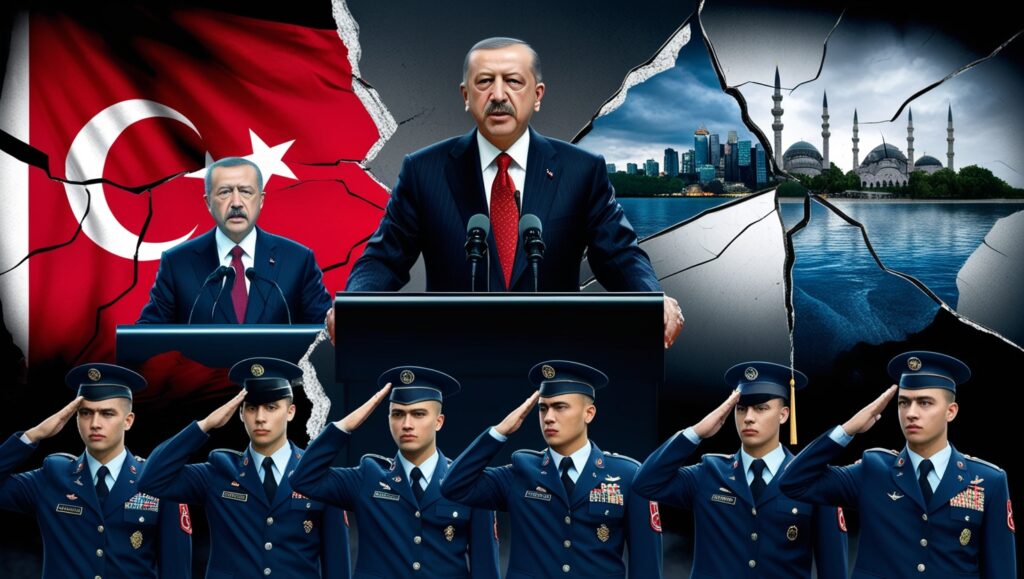Introduction
Turkey, once hailed as the beacon of secularism in the Islamic world, is witnessing a dramatic shift under President Recep Tayyip Erdogan. His recent statement, calling for the punishment of military graduates who have sworn to defend Turkey’s secular constitution, marks a sharp departure from the ideals of Mustafa Kemal Atatürk, the founder of modern Turkey. Yet, the global reaction has been muted, with no major powers, including the US or India, raising their voices. This silence is as troubling as the actions themselves.
Erdogan’s War Against Secularism
Erdogan has been chipping away at Turkey’s secular foundations for years. His latest move is a direct challenge to the principles that have governed the country since its inception in 1923. The Turkish military, historically the guardian of secularism, now finds itself at odds with its Commander-in-Chief. Erdogan’s disdain for secularism is no secret, but what’s alarming is the boldness with which he is dismantling it. By 2022, he had already removed key references to Atatürk’s secular vision from the military oath. Now, he has gone further, publicly threatening to punish those military officers who still pledge loyalty to a secular and democratic Turkey.
The Global Silence
What makes Erdogan’s actions even more concerning is the global community’s indifference. While Turkey’s slide into authoritarianism is being widely reported, concrete action from world powers remains absent. Despite numerous articles documenting Erdogan’s crackdown on pro-secular military graduates, no major nation has taken a firm stance against it. Even democratic countries, which often champion freedom and secularism, have remained silent.
This global inaction raises uncomfortable questions: Why are nations like the US, India, and members of the European Union not voicing their concerns? Is Turkey’s strategic position in NATO too valuable for world leaders to challenge Erdogan directly? Or are there deeper geopolitical reasons behind this silence?
What Secularism Means in Different Parts of the World
To understand the significance of Erdogan’s attack on secularism, it’s important to explore how the concept varies across the globe. In the West—particularly in the US, Canada, and much of Europe—secularism is the separation of religion and state. Governments operate independently of religious institutions, and there’s no interference in state matters.
However, in countries like India, secularism has a slightly different meaning. Here, the state treats all religions equally. This difference in interpretation shapes how secularism is defended or undermined in different regions. The situation in Turkey is particularly complex, where the state assumes every newborn is Muslim unless otherwise stated, revealing a more diluted form of secularism that Erdogan seeks to erode further.
The Rise of Religious States: A Global Perspective
Turkey’s gradual move towards becoming a religious state isn’t an isolated case. Across the globe, several countries maintain official state religions. In England, for example, Christianity is the state religion, a fact that often surprises many who assume the UK to be a secular country. Similarly, countries like Pakistan, Afghanistan, and Iran have Islam as their state religion. Sri Lanka, too, is not a secular country despite its diverse religious makeup.
However, what differentiates Turkey from these nations is its history. Turkey was designed to be a secular republic after the collapse of the Ottoman Empire, a vision championed by Atatürk. Erdogan’s push towards Islamization, therefore, is a direct challenge to the republic’s core values.
Turkey’s Military and Its Role in Defending Secularism
Historically, the Turkish military has played a pivotal role in safeguarding the country’s secular constitution. After the Ottoman Empire’s collapse, Atatürk sought to modernize Turkey, ensuring that religion would not dominate its political and social life. For decades, military graduates took an oath to defend a secular and democratic Turkey, viewing themselves as protectors of Atatürk’s vision.
In the Global Firepower Index, Turkey is ranked as a major military power, despite lacking nuclear weapons. As a NATO member, Turkey’s military strength is significant. However, since Erdogan’s rise to power, he has systematically weakened the military’s secular foundation. The removal of key secular references from military oaths in 2022 was a significant step in this direction.
A Bold Defiance by Young Military Graduates
Despite Erdogan’s efforts, many young Turkish military officers continue to resist. In a powerful act of defiance, recent military graduates publicly took an oath to defend a secular and democratic Turkey. This act, caught on video and widely circulated, has enraged Erdogan, who has vowed to punish these graduates. Yet, punishing such a large group of officers may prove challenging for Erdogan, especially as their belief in secularism remains unwavering.
Erdogan’s Vision for Turkey: A Radical Shift
Erdogan’s ultimate goal appears to be the creation of an Islamic state, radically different from Atatürk’s secular vision. He has openly called for an Islamic alliance against Israel, further cementing his desire to align Turkey with more radical Islamic ideologies. His disdain for Mustafa Kemal Atatürk, who envisioned a modern, democratic Turkey with equal rights for all, is palpable.
By removing references to Atatürk and secularism from military oaths, Erdogan is systematically erasing the republic’s secular heritage. His vision for Turkey seems clear: a more authoritarian, religiously conservative state, where dissent is not tolerated, and secularism is a thing of the past.
Conclusion
Turkey’s ongoing transformation under Erdogan is a significant geopolitical development, one that the world cannot afford to ignore. The silence from major world powers is deafening, especially as Erdogan continues his war on secularism. As Turkey drifts further from Atatürk’s vision, the question remains: Will the world continue to stand by in silence, or will it finally speak out against the erosion of secularism

